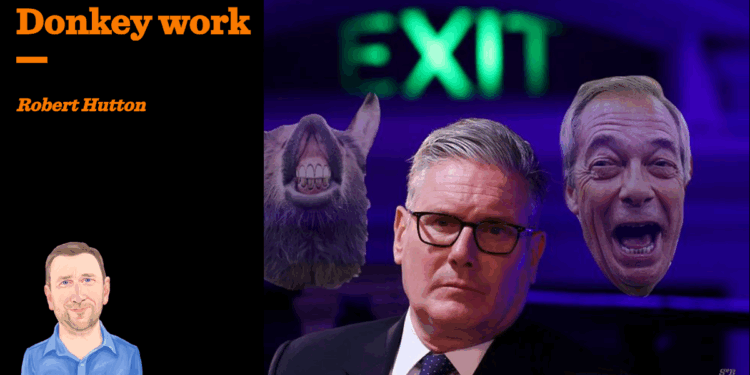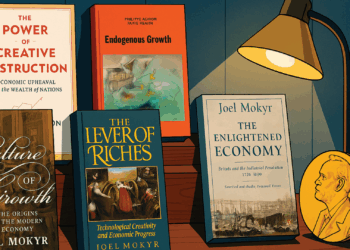“Unpopular in the country, under pressure in the country!” Laura Kuennsberg’s introduction to the prime minister was accurate, if a touch brutal for nine on a Sunday morning. Next to her, Keir Starmer’s eyes flickered over even as he tried to keep his face immobile. Perhaps he was wishing he’d stayed in bed.
“I want nobody to leave this conference not knowing what matters most to me,” he’d told her in a clip recorded on the journey up to Liverpool, inadvertently revealing the big problem with his government: not even Labour party members currently know what he thinks about anything. Indeed, the long silences from Downing Street on questions like “Racism bad —Y/N?” suggest that the uncertainty extends further into his inner circle than seems ideal.
What lies behind this indecision? Starmer is, as his critics so often tell us, a North London human rights lawyer. It seems unlikely that he doesn’t know what he thinks about Tommy Robinson supporters marching through London, or indeed plans for the mass deportation of people who have legally come to Britain and made their lives here. A plausible explanation is that he knows what he thinks, but fears that the rise of Reform shows that a lot of people who would ideally be voting Labour don’t agree with him.
Whatever the reason, on Sunday morning the worm was turning and the gloves were coming off, if a worm can wear gloves. After some testy opening exchanges with Kuenssberg, the prime minister suddenly shifted from talking about money for overlooked towns and started giving the message he’d come to talk about: patriotism.
“I love and have pride in my country and I want to serve the whole of our country, our beautiful, tolerant, diverse country,” he said, out of nowhere. “Reform do not believe in that country.” Their plans would mean deporting people “who have been here for years, working in our hospitals and our schools, running businesses, our neighbours — that would tear our country apart.”
Stand-up comedians say the craft in their job is delivering jokes as though they’ve just popped into their head, rather than having been carefully honed over weeks or months. The same is true of politicians: can you drop a carefully prepared line into an interview and make it sound utterly fresh? Most of them can’t. The real masters, like Tony Blair, can genuinely improvise, riffing around their subject while staying within the agreed lines like a jazz trumpeter hitting the midnight stretch at Ronnie Scott’s.
This was the line, it had been workshopped for several days, and now he was going to deliver it
But listening to Starmer is more like hearing a teenager play a carefully rehearsed flute solo: the right notes, even more or less in the right order, but plodded through. This was the line, it had been workshopped for several days, and now he was going to deliver it.
Kuenssberg asked if Reform’s policy was immoral? Yes it was. More than that, the prime minister went on, “the fight with Reform is different”. This is an argument that he hasn’t made before. One of the acute frustrations of many Labour supporters is that the party’s response to Farage’s proposals has generally been not “that is a wicked idea” but “that will never work”. Now Starmer was licensing a new form of attack.
“Do you think it’s a racist policy?” Kuenssberg asked.
“I do.”
“And do you think that Reform UK is trying to appeal to racists?”
“No,” Starmer replied. This was the landmine: the prime minister may well suspect that a third of the country are racists, but he’d quite like some of them to vote for him, and saying it won’t help that project. Fortunately, the phrasing of the question helped him. The long, long history of Farage’s time in politics is that appealing to racists is something he’s never had to try to do. His appeal to racists is as effortless as Sydney Sweeney’s appeal to teenage boys.
Finally, we moved to the story that has got the whole nation up in arms, DonkeyGate. No one will have forgotten that, in perhaps the single greatest act of wickedness ever perpetrated by a British politician, the vile Starmer once bought the field next to his parents’ house so that — and I shudder as I type the words — they could look after donkeys there. If you want to take a breath or drink a glass of water before you read on, do. We’ll wait.
Ready? We’ll continue. It was revealed in Sunday’s papers that Starmer didn’t either avoid or evade tax on the field when his parents died. There truly is no depth to which the man will not sink.
Kuenssberg, on behalf of an outraged nation, demanded answers. The prime minister explained that his father had liked to push his mother’s wheelchair out into the field so that she could stroke the donkeys. “She loved her donkeys,” he said, fondly. What a bunch of total bastards.












